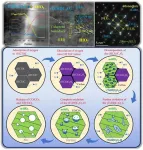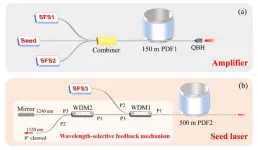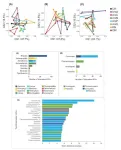(Press-News.org) Cambridge scientists may have discovered a new way in which fasting helps reduce inflammation – a potentially damaging side-effect of the body’s immune system that underlies a number of chronic diseases.
In research published in Cell Reports, the team describes how fasting raises levels of a chemical in the blood known as arachidonic acid, which inhibits inflammation. The researchers say it may also help explain some of the beneficial effects of drugs such as aspirin.
Scientists have known for some time that our diet – particular a high calorie Western diet – can increase our risk of diseases including obesity, type 2 diabetes and heart disease, which are linked to chronic inflammation in the body.
Inflammation is our body’s natural response to injury or infection, but this process can be triggered by other mechanisms, including by the so-called ‘inflammasome’, which acts like an alarm within our body’s cells, triggering inflammation to help protect our body when it senses damage. But the inflammasome can trigger inflammation in unintentional ways – one of its functions is to destroy unwanted cells, which can result in the release of the cell’s contents into the body, where they trigger inflammation.
Professor Clare Bryant from the Department of Medicine at the University of Cambridge said: “We’re very interested in trying to understand the causes of chronic inflammation in the context of many human diseases, and in particular the role of the inflammasome.
“What's become apparent over recent years is that one inflammasome in particular – the NLRP3 inflammasome – is very important in a number of major diseases such as obesity and atherosclerosis, but also in diseases like Alzheimer's and Parkinson's disease, many of the diseases of older age people, particularly in the Western world.”
Fasting can help reduce inflammation, but the reason why has not been clear. To help answer this question, a team led by Professor Bryant and colleagues at the University of Cambridge and National Institute for Health in the USA studied blood samples from a group of 21 volunteers, who ate a 500kcal meal then fasted for 24 hours before consuming a second 500kcal meal.
The team found that restricting calorie intake increased levels of a lipid known as arachidonic acid. Lipids are molecules that play important roles in our bodies, such as storing energy and transmitting information between cells. As soon as individuals ate a meal again, levels of arachidonic acid dropped.
When the researchers studied arachidonic acid’s effect in immune cells cultured in the lab, they found that it turns down the activity of the NLRP3 inflammasome. This surprised the team as arachidonic acid was previously thought to be linked with increased levels of inflammation, not decreased.
Professor Bryant, a Fellow of Queens’ College, Cambridge, added: “This provides a potential explanation for how changing our diet – in particular by fasting – protects us from inflammation, especially the damaging form that underpins many diseases related to a Western high calorie diet.
“It’s too early to say whether fasting protects against diseases like Alzheimer's and Parkinson's disease as the effects of arachidonic acid are only short-lived, but our work adds to a growing amount of scientific literature that points to the health benefits of calorie restriction. It suggests that regular fasting over a long period could help reduce the chronic inflammation we associate with these conditions. It's certainly an attractive idea.”
The findings also hint at one mechanism whereby a high calorie diet might increase the risk of these diseases. Studies have shown that some patients that have a high fat diet have increased levels of inflammasome activity.
“There could be a yin and yang effect going on here, whereby too much of the wrong thing is increasing your inflammasome activity and too little is decreasing it,” said Professor Bryant. “Arachidonic acid could be one way in which this is happening.”
The researchers say the discovery may also offer clues to an unexpected way in which so-called non-steroidal anti-inflammatory drugs such as aspirin work. Normally, arachidonic acid is rapidly broken down in the body, but aspirin stops this process, which can lead to an increase in levels of arachidonic acid, which in turn reduce inflammasome activity and hence inflammation.
Professor Bryant said: “It’s important to stress that aspirin should not be taken to reduce risk of long terms diseases without medical guidance as it can have side-effects such as stomach bleeds if taken over a long period.”
The research was funded by Wellcome, the Medical Research Council and the US National Heart, Lung, and Blood Institute Division of Intramural Research.
Reference
Pereira, M & Liang, J et al. Arachidonic acid inhibition of the NLRP3 inflammasome is a mechanism to explain the anti-inflammatory effects of fasting. Cell Reports; 23 Jan 2024; DOI: 10.1016/j.celrep.2024.113700
END
Scientists identify how fasting may protect against inflammation
2024-01-30
ELSE PRESS RELEASES FROM THIS DATE:
Superfluids could share characteristic with common fluids
2024-01-30
Every fluid — from Earth’s atmosphere to blood pumping through the human body — has viscosity, a quantifiable characteristic describing how the fluid will deform when it encounters some other matter. If the viscosity is higher, the fluid flows calmly, a state known as laminar. If the viscosity decreases, the fluid undergoes the transition from laminar to turbulent flow. The degree of laminar or turbulent flow is referred to as the Reynolds number, which is inversely proportional to the viscosity. The Reynolds law of dynamic similarity or Reynolds similitude, states that if two fluids flow around similar structures with different length ...
Alzheimer’s treatment roadblocks can be eased by engaging primary care providers in screenings
2024-01-30
There is substantial geographic variation across the U.S. health care system to diagnose and treat early-stage Alzheimer’s disease with disease-modifying therapies, and engaging primary care providers in the effort may be a key to accelerating delivery of emerging new treatments, according to a new RAND report.
Enabling primary care practitioners to diagnose and evaluate patients for treatment eligibility would make the biggest impact on reducing wait times for specialists and increase the number of people treated with disease-modifying therapies from 2025 through 2044.
While primary care providers are technically capable of performing cognitive assessments, ...
New study identifies link between presence of oncofoetal ecosystem and liver cancer recurrence
2024-01-30
A new causal link has been found between the presence of oncofoetal ecosystems and recurrence and response to immunotherapy in primary liver cancer, hepatocellular carcinoma (HCC)
The findings will pave the way to use the presence of oncofoetal ecosystems as a biomarker to treat HCC, a disease with a poor prognosis that is typically diagnosed late
Singapore, 30 January 2024 - A team of clinician-scientists and researchers from the National Cancer Centre Singapore (NCCS), Agency for Science, Technology and Research (A*STAR), the Harry Perkins Institute of Medical Research and global research partners, has found a causal link between the presence of oncofoetal ...
Unveiling the effect of Ti substitutions on the static oxidation behavior of (Hf,Ti)C at 2500 ℃
2024-01-30
Hf-based carbides are highly desirable candidates for thermal protection applications above 2000 ℃ due to their extremely high melting point and favorable mechanical properties. However, as a crucial indicator for composition design and performance assessment, the static oxidation behavior of Hf-based carbides at their potential service temperatures has been rarely studied.
In a study published in the KeAi journal Advanced Powder Materials, a group of researchers from Central South University and China Academy of Launch Vehicle Technology revealed the static oxidation mechanism ...
High power fiber laser at 1.2 μm waveband
2024-01-30
Laser sources operating at the 1.2 μm wavelength band have some unique applications in photodynamic therapy, biomedical diagnosis and oxygen sensing. Additionally, they can be adopted as pump sources for mid-infrared optical parametric generation as well as visible light generation by frequency doubling. Laser generation at 1.2 μm waveband has been achieved with different solid-state lasers including semiconductor laser, diamond Raman laser, and fiber laser. Among these three types, fiber laser thanks to its simple structure, good beam quality, and operation flexibility, is a great choice for 1.2 μm waveband laser generation.
Researchers ...
Integrated design of Global Ocean Observing System essential to monitor climate change
2024-01-30
We know that our climate is changing. Extreme weather events are becoming more common, sea levels are rising and overall, our planet is getting warmer. Monitoring these changes is critical. One of the best indicators of climate change is the Ocean Heat Content (OHC) estimate, a measurement of overall oceanic temperature calculated by gathering water temperature data in oceans around the world in differing locations, at varying depths and across time. The data necessary to calculate the OHC over such a wide-spread area is gathered by the Global Ocean Observing System (GOOS), an integrated network of platforms ...
Nitrogen-based fertilizers differentially affect protist community composition in paddy field soils
2024-01-30
Soil microbiome has far-reaching significance, particularly for rice production, which can be better explained with a Japanese proverb: “Rice grows with soil fertility, while upland crops depend on fertilization”. Therefore, understanding the paddy field microbiome is crucial for sustainable soil fertility and rice production. This would also lead us to overcome the global food shortage problem as rice is the primary food source for nearly half of the world's population. Among the paddy field microbes, bacteria, fungi, and archaea are well-studied, while protists, the vast majority of eukaryotes, are largely unknown. Protists are the most diverse eukaryotic microorganisms ...
Systemic US reforms needed to prevent mass death in the next pandemic
2024-01-30
Ahead of the 2024 US presidential election, The BMJ today launches a forward-looking series that highlights the lessons that can be learned from the US’s covid-19 experience and the actions that are needed to prevent the loss of another million citizens in the next pandemic and improve and protect population health.
The articles, written by leading clinicians and researchers across the US, explore topics such as how systemic racism and economic inequality contributed to covid-19 disparities; mass incarceration and poor prison health as a driver of the pandemic; ...
U.S. regulatory system failed to prevent thousands of deaths in frontline workers during the pandemic
2024-01-30
An analysis published today in the The BMJ examines the risks faced by frontline workers in the United States during the pandemic and suggests reforms that could protect population health and save lives.
Lead author Professor David Michaels at the George Washington University and his colleagues note that from the onset laws and regulations in the United States inadequately protected frontline workers. The gaps allowed a rapid spread of disease in US workplaces like meat packing plants. At the same time, these essential workers were rarely seen as a population that needed special attention ...
Innovative school Citizen Science project involving over 1000 scientists, 110 schools, 800 samples and U.K.’s synchrotron published in CrystEngComm
2024-01-30
Results of a large-scale innovative Citizen Science experiment called Project M which involved over 1000 scientists, 800 samples and 110 UK secondary schools in a huge experiment will be published in the prestigious RSC (Royal Society of Chemistry) journal CrystEngComm on 29 January 2024. The paper is titled: “Project M: Investigating the effect of additives on calcium carbonate crystallisation through a school citizen science program”. The paper shares a giant set of results from the school citizen scientists who collaborated with a team at Diamond to find out how different additives affect the different forms of calcium carbonate produced. These additives affect the ...





